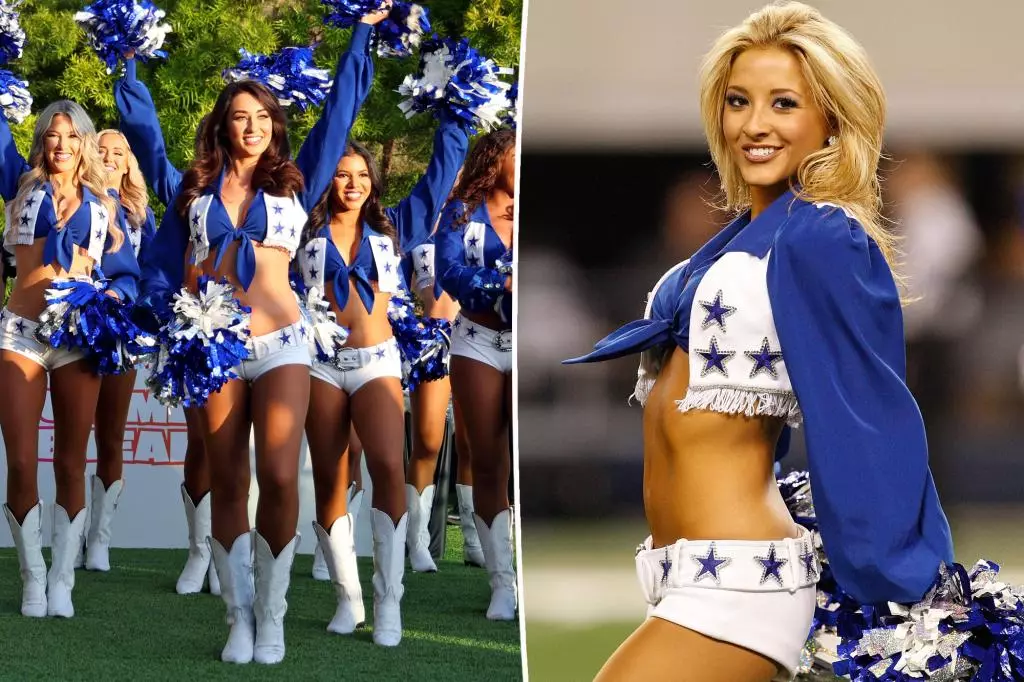The Dallas Cowboys Cheerleaders, an iconic symbol of the NFL and American pop culture, are witnessing a transformative change in their compensation structure. After years of advocating for a living wage, these talented performers have achieved a remarkable 400 percent increase in their hourly pay, translating to a potential $75 per hour by the 2025 NFL season. This monumental victory is chronicled in the second season of their Netflix series, “America’s Sweethearts: Dallas Cowboys Cheerleaders,” where the struggles and triumphs of cheerleaders in the face of systemic challenges become a central theme. This substantial raise is not just a figure on paper; it signifies a shift in how professional cheerleaders are valued in the world of sports.
The journey towards fair compensation has been long and arduous. Jada McLean, a seasoned cheerleader with five years of experience, described a stark reality in the past. Previously earning a mere $15 per hour and $500 per game appearance, the question arises: why were these athletes, who contribute so much to team spirit and fan engagement, compensated so poorly? This increase opens the door for genuine discussions around the economic hardships that have traditionally plagued cheerleaders, who often needed supplementary employment to make ends meet during their tenure with the team.
The Fight for Fairness
The struggle for fair wages has not been a solitary endeavor. McLean shared that the decision to strike was almost taken to amplify their message to management, highlighting the seriousness of their plight. This moment of solidarity reflects a broader trend in labor movements where workers are increasingly willing to put everything on the line to secure fair treatment. Armani Latimer, another cheerleader, illustrates the emotional weight of their fight for justice, noting the pride in effecting change, even knowing she might not directly benefit from it herself.
Historically, the pay structure for Dallas Cowboys Cheerleaders has been less than ideal. Reports indicate that until recently, cheerleaders made between $75 to $150 per game, which often excluded important factors like rigorous practice sessions, leading many to conclude that their labor was undervalued. Erica Wilkins, a former cheerleader, took a bold step by filing a lawsuit over unfair wage practices. Her endeavor not only brought attention to wage disparities but also empowered others to question the status quo and demand better treatment.
Continuing Challenges
Despite the positive changes, it’s essential to recognize the hurdles that remain. McLean candidly mentioned that health benefits are still not part of their compensation package, which raises further concerns about the long-term welfare of the cheerleaders. In a profession marked by the physical demands of dance and performance, lack of health coverage could endanger the well-being of these athletes. The need for comprehensive health benefits raises the question: how can a league that generates billions in revenue justify the absence of health coverage for an essential part of its entertainment fabric?
The stories shared by former cheerleaders reveal a systemic issue that transcends just the Dallas Cowboys organization. Kristin Westbrook’s recounting of her time with the cheerleaders sheds light on the culture of under-compensation that pervaded the profession. Her experience exemplifies the broader theme of cheerleaders often receiving less than their due, battling fiercely to establish their value, and finding strength within their community to push for change.
The Road Ahead
As the narrative unfolds in “America’s Sweethearts,” the audience gets a closer look at the intense auditions and demanding training sessions, reflecting what it truly takes to become a Dallas Cowboys Cheerleader. This behind-the-scenes glimpse extends beyond the glitz and glamour, laying bare the effort, perseverance, and advocacy that go into this role. The transformation of their pay structure can serve as a rallying point for other cheerleading squads and performers in sports, illuminating a path for further advancements in wage equality.
Ultimately, the cheerleaders’ journey is not just about dollars and cents; it’s a powerful example of how collective action can fuel meaningful changes in deeply rooted injustices. As more attention is given to the modest yet essential roles many performers play in the sports industry, the victory of the Dallas Cowboys Cheerleaders may serve to empower other communities to pursue their rights and strive for recognition in an often overlooked but vital sector of professional athletics.

Leave a Reply